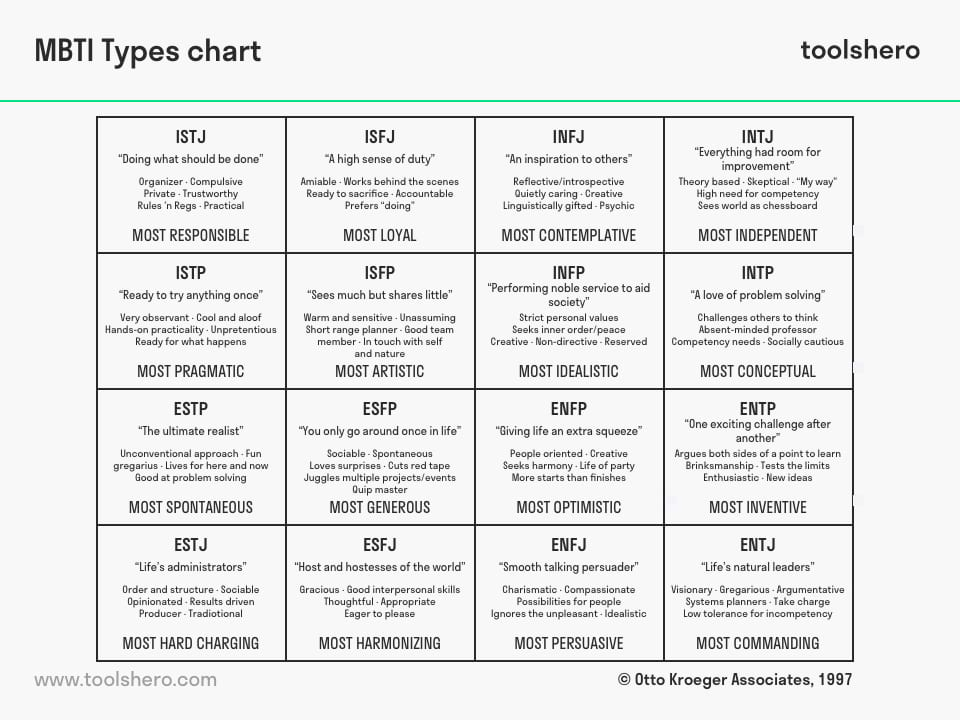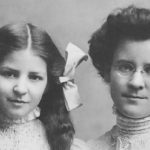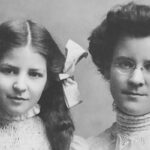Myers Briggs Personality Test (MBTI)

Myers Briggs personality test: this article explains the Myers Briggs personality test, developed by Isabel Myers and Katharine Briggs in a practical way.
Next to what it is, this article als highlights the four dimensions, the procedure, the diplomats, the explorers, the application of the Myers Briggs personality test and a ready-to-use questionnaire. Enjoy reading!
What is the Myers Briggs personality test?
Each person has his or her own personal preferences. The Myers Briggs personality test helps identify what someone’s reasons and motivations are, what their ideal working environment is and how they interact with colleagues.
It is a questionnaire with dozens of questions on someone’s preferences and working style. How well do you know yourself? This test is a tool to help people understand themselves.
The Myers Briggs personality test and chart were developed by Katharine Briggs and Isabel Myers and based on Carl Jung ’s psychological types.
Four dimensions of the Myers Briggs personality test
The MBTI personality test is the most widely used personality assessment in the world through which people get to know themselves better.
It describes the preferences of someone in 4 dichotomous dimensions:
- Focus on the outer world: extra version versus introversion
- Ways of perceiving: sensing versus intuition
- Decision-making: thinking versus feeling
- Way of working: judging versus perceiving
In the Myers Briggs personality test there are no right or wrong preferences and therefore there are no good or bad personality types.
After all, each individual is different and therefore the model is purely about personal preferences.

Figure 1 – Myers Briggs personality test chart / MBTI test chart
1. Environment
This dimension of the Myers Briggs personality test chart is about extra version (E) versus Introversion (I). Extroverts find energy in the external world and they prefer verbal communication. They prefer to work out ideas by talking.
They have broad interests, are sociable and expressive and take initiative in work and in relationships. Introverts find energy in the inner world of thoughts, feelings and ideas.
This type is more drawn towards their inner world. They prefer to communicate in writing and they want to work out ideas by reflecting on them. They are private and subdued but take initiative when something is important to them.
2. Sensing
This dimension of the Myers Briggs personality test chart is about Sensing (S) versus Intuition (N). In sensing, people get information by using the five senses.
They are oriented to facts and present realities. They build careful and thorough conclusions, understand ideas, observe and remember specifics and want to apply theories through practical applications.
Intuitive people have great imagination and they are verbally creative. They move quickly towards conclusions based on hunches; they trust inspirations and remember few specifics.
3. Decisions
This third dimension is about Thinking (T) versus Feeling (F). Decisions are based on logic and objective analysis of cause and effect.
They are analytical, reasonable and solve problems with logic. Sometimes they can come across as relentless.
Feelers are empathetic and assess decisions by how people respond to them. They strive for harmony and positive interactions, which make them appear mild-mannered.
4. Work
This fourth and final dimension of the Myers Briggs personality test chart is about Judging (J) versus Perceiving (P). People who prefer judging like a planned and organized approach to life.
They work systematically, like to settle matters and try to avoid last-minute stress. Perceptive people, have a flexible and spontaneous approach to life and like to keep their options open, they are open to change and feel energized by last-minute stress.
Procedure
Each participant in the test has a preference for each of the characteristics and this will result in the appropriate letter in their personal code.
Combining the four characteristics leads to 16 different types of personality. For example: someone with the code INTJ is an introvert (I), intuitive (N), thinker (T) and is a judger (J). The Myers Briggs personality test gives an indication of someone’s preferred behaviour not of someone’s knowledge, skills or behaviour.
The Analysts
The following four personality types described fall into the category of analysts.
INTJ
Someone with the INTJ personality type is called the architect. The architect is one of the rarest and most capable personalities there is. These tactically savvy individuals love to perfect details and apply creativity and rationality to everything they do. Their inner world is often dynamic, private and complex.
The architect (INTJ) is quick-witted and proud of his ability to think for himself. They have an extraordinary talent for seeing right through fake and hypocritical people. Their minds never rest, leaving others struggling to keep up with the architect.
Where others trust the status quo, the architect asks a question about everything. They prefer to make their own discoveries, always with a skeptical approach. They are not afraid to break the rules or risk disapproval. Architects like to be successful and will never share an idea if the idea doesn’t work.
Architects do not like to collaborate and like to make decisions without asking and considering the input of others. At times they may appear callous, but it is a mistake to claim that they are actually callous. Architects are deeply empathetic and spend a lot of time reflecting when things go wrong or when they hurt others.
Architects are generally cynical and view most people as lazy, doomed to mediocrity and unimaginative. They would rather be right than be popular.
Yet every personality type craves social contact, and so does the architect. They prefer to surround themselves with people who share their values.
Examples of famous people who share the INTJ personality type are Michelle Obama, Friedrich Nietzsche, Elon Musk and Arnold Schwarzenegger.
INTP
The INTP is also known as the logician. The logician is a flexible thinker who likes to approach many aspects of life in an unconventional way. They prefer to experiment as much as possible and combine this with their personal creativity.
Logicians are proud individuals, particularly of their intellect and unique perspectives. They think and puzzle about the mysteries of the universe. The INTP is rare and easily distinguishes itself from the rest of the personalities in the MBTI test.
Logicians are often lost in thought. They never stop thinking. From the moment they wake up to the moment they go to sleep, their minds are buzzing with ideas. Their reputation therefore includes terms such as pensive, aloof and a bit reserved and quirky. After a long day in social situations, they crave to be alone with their thoughts.
Yet they are not completely unfriendly or tense. Surrounded by the right company, these types light up and switch from one thought to another. Few things give them as much energy as exchanging ideas.
Logicians love to analyze patterns. They have an extraordinary talent for detecting discrepancies and irregularities. Lying to this personality type is therefore almost never successful.
They can change their mind about just about anything, whether it’s weekend plans or morale. In addition, they like to play devil’s advocate for the sake of discussion.
ENTJ
The type ENTJ is described as the commander. The commander is a decisive leader who loves momentum and performance. They gather information to develop their creative vision, but hardly ever hesitate to make decisions.
Commanders are born leaders. They have charisma and inspire confidence in others. They can also get people behind them for a common goal. Commanders are characterized by a ruthless rationality and drive. Only three percent of people share this personality type. They overwhelm the more timid personalities, but the world owes a lot to the commanders.
Commanders love a challenge, big or small. This makes the type of brilliant entrepreneurs. Their ability to stick to the long-term vision also makes them good business leaders.
Commanders are relentless and dominant at the negotiating table, when buying a car or in any corporate environment. Not because they are cold-blooded or mean, but because they like a challenge.
People who get along well with commanders are people who can compete with them intellectually. Commanders have special skills when it comes to recognizing talents in others. This helps with team building. What they often get into trouble with is pointing out failures in others. They do this with a chilling degree of callousness.
ENTP
The ENTP is a debater, a person who tends to be bold and creative. With the utmost mental agility, they deconstruct and rebuild ideas. Despite the resistance they experience, they pursue their goals in a powerful way.
The debater is quick-witted and daring. They are not afraid to disagree with the status quo. In fact, they are afraid of nothing and no one. There are few things that make the ENTP happier than a game of verbal sparring with an equal conversation partner.
This personality type has a playful sense of humor and can be very entertaining. They have a contrarian idea of fun that comes with healthy and spirited conversations. Debaters are known for being rebellious. For them no faith is sacred and they question everything.
Debaters love to brainstorm and think big, but often fail to put their ideas into practice. That’s because they have too many thoughts and suggestions to keep up with them. They may therefore experience difficulty in fully exploiting their potential.
Debaters’ ability to debate is legendary and the strongest of all types in the MBTI test, but it is not always useful. When they always take apart everything that someone else says, for example their boss, they can also do their chances of success more harm than good.
Course: the Complete Guide To The Myers-Briggs Type Indicator (MBTI)
The Diplomats
The following four personality types described fall into the diplomatic category within the MBTI test.
INFJ
The INFJ is referred to as advocate. The advocate tends to approach life with a deep thoughtfulness and imagination. Their personal vision and principles guide them in all things of life.
Advocates are the rarest personality type, but they have a lot of influence on the world. They are idealistic and principled and don’t think it’s enough to just go through life. They want to make a difference.
For this personality type, success does not mean having a lot of money or high status. They are constantly seeking fulfillment, helping others and being a good force in this world.
Due to the fact that this is a rare personality type, the advocates often feel that they are different from most people. Their rich inner life and abiding desire to find a life purpose does not always suit the people around them. Yet they can intensely enjoy social acceptance or close relationships. Sometimes they just feel misunderstood.
INFP
The INFP is a mediator. The Mediator is a rare personality type that tends to be quiet, imaginative, and open-minded. They apply a caring and creative approach to everything they do.
They may seem quiet and modest, but the mediator has a passionate and lively inner life. They often lose themselves in their daydreams and make up all kinds of stories and conversations in their heads.
Mediators are idealistic and empathetic. They long for deep and meaningful relationships and feel called to help others. They sometimes feel alone and lonely, looking for someone who shares their traits.
Mediators have a genuine curiosity about human nature. They are well attuned to their own feelings and thoughts, but they like to understand others better. If someone opens up to a mediator, they feel honored to listen and help where possible.
Individuals with this personality type often feel that they are directionless in life or feel stuck.
ENFJ
The ENFJ is a protagonist. The protagonist is a warm, sincere person who enjoys helping others. They have strong values and ideas and support their perspective with creativity to achieve their goals.
Protagonists feel strongly that they have to serve a greater purpose in life. Thoughtful and idealistic, these individuals strive to make a positive impact on the lives of others. They hardly ever shy away from an opportunity to do the right thing, even if it’s uncomfortable.
Protagonists are born leaders. This explains why this type is generally often identified in politicians and teachers. Their passion and charisma enables them to convince and inspire others, in every area of their lives.
Protagonists have a powerful ability to discover people’s underlying motivations and motives. Sometimes they don’t even understand themselves how they read and understand others so quickly.
When protagonists care about someone, they help that person to solve problems, at any cost. Many people are therefore grateful for their protagonist boyfriend or girlfriend. It’s not without reason that people of this type have a reputation of being committed to helping others.
ENFP
The ENFP is known as a campaigner. And not without reason. These people tend to embrace big ideas and wishes and carry them out to others. They are free spirits who are outgoing, outspoken and open-minded. Their lively and positive approach to life contrasts with that of the rest of society. Campaigners do not only want to have fun, but also long for meaningful and emotional connections with others.
They are committed to their social life and enriching their relationships. They have a healthy dose of imagination, curiosity and creativity. They cannot be a campaigner without these qualities.
Campaigners are proof that those seeking the pleasures of life don’t have to be just superficial. They can instantly transform people into passionate idealists and are able to turn shy people into carefree figures on the dance floor.
A pitfall of this type is that they can break their head over the desires or intentions of others. This creates social stress and can keep them up at night.
The Sentinels
Below we describe the four personality types that fall into the sentinel category.
ISTJ
The ISTJ is known as the logistician within the MBTI test. The logistician is a person who is reserved, yet willful. They have a rational outlook on life and carefully compose their actions. These people pride themselves on their integrity. They mean what they say and do what they say.
This personality type is one of the most common types in the world population. They do not seek much attention, but do what they can to keep society stable and solid. They often earn respect for their reliability and their usefulness. They can also continue to reason rationally and logically in stressful situations.
The logistician rarely hesitates to take charge and responsibility for a situation. They are quick to admit their own mistakes and value honesty above all else. They would rather satisfy their own conscience than lie to impress others.
They go to great lengths to fulfill their obligations and are often surprised and disappointed in people who do not share these values. When the logistician thinks someone is lazy or dishonest, they cannot hide their disdain for it. This can sometimes make them appear stern or unsympathetic.
ISFJ
The ISFJ is the defender. The defender is a warm and humble person. They are responsible, efficient and pay a lot of attention to practical matters in their lives. The defender’s modesty and demureness helps keep the world going. They work hard and are committed to what they do. Many people with this personality type feel a strong sense of responsibility.
These people make sure that deadlines are met, birthdays are remembered and then special occasions are celebrated. They also find it important that traditions are preserved. They don’t often demand credit for what they do, but do what they have to do behind the scenes.
One of the defender’s most distinguishing traits is loyalty. It’s not often that a defender lets a friendship or relationship fade because they don’t put in the effort. They invest a lot of energy in maintaining strong ties with their loved ones. More than other types of the MBTI test.
Defenders are introverted, but have a deeply social nature. They have a strong ability to remember details and information about the lives of their loved ones. Few people are as good at picking out a gift for the people they know as the Defenders.
They love to help others and build a stable and safe life.
ESTJ
The ESTJ personality type is known as the executive. These people are very steadfast and follow their own sensible judgment. They are often the stabilizing force in a troubled environment and are able to provide solid leadership.
Executives are honest, committed and dignified. They are appreciated for their clear advice and clear guidance. They do not shy away from responsibility and even like to lead the way in difficult times.
They pride themselves on bringing people together and so often take on the role of community organizers. They work hard and defend traditions and common values that hold families and groups together.
The demand for these types is high in democratic society. They make up a relatively large part of the population at 11%. Many American presidents shared this personality type.
Executives are very aware of their environment and live in a world of verifiable facts. The opinions they share are not just empty slogans, but rather deliberate positions.
ESFJ
The consul (ESFJ) is attentive, people-oriented and likes to participate in activities in a social context. They enjoy helping others and see life as something to be shared with others. The people who have this personality type are often the foundation of communities, opening their homes and hearts to friends, neighbors, and loved ones.
Consuls are not saints, but they do believe in the power of doing good and hospitality. They have a strong sense of duty when it comes to helping others. They are generous and trustworthy and often stick up for others. Consuls have clear views on right and wrong which causes them to be seen as headstrong by others at times.
The consuls are the people at a party who chat with everyone to make sure everyone is having a good time. They are not superficial, but go through life while staying true to their relationships and helping others where they can.
For many consuls it is a challenge to accept that they have no influence over the behavior and thoughts of others. Fortunately, they can find peace and satisfaction by focusing on what they are good at: being an example, giving attention and taking responsibility.
The Explorers
The four personality types that belong to the explorers category are described below.
ISTP
Someone with the ISTP personality type is also called the virtuoso. And for a reason. They tend to have an individualistic mindset and pursue their personal goals without needing a lot of connections. They are very eager to learn and usually have many general skills.
Virtuosos love to explore and investigate the world around them with rationalism and curiosity. They are natural makers, and they like to build things. They are often mechanics and engineers who like nothing more than to get their business dirty while they are useful. Taking things apart and putting them back together is what makes them happy.
They like it when people are interested in their ideas, as long as those people don’t interfere with their principles and freedom. They like to help others and share their experiences, especially with those close to them.
About 5% of the world population consists of virtuosos, according to the developers of the MBTI test. This type is much more common in men than in women. The typical gender roles that society expects do not fit well with this personality type.
The decisions that virtuosos make stem from practical realism. They feel a strong sense of justice and are very tolerant. Their pitfall is that they expect others to be as tolerant as well. Virtuosos will therefore be the first to tell an insensitive joke.
ISFP
The ISFP is also known as the adventurer. The adventurer has an open mind and a warm heart. That’s how they approach their lives. The ability of these people to live in the moment helps them to experience exciting moments.
Adventurers are artists, but not always in the conventional sense of the word. For the adventurer, life is a canvas on which they can express themselves however they want. Every adventurer is unique, driven by curiosity and enthusiasm. These people have a wide range of passions and interests. Their inquiring mind helps to find joy in every nook and cranny of everyday life.
This makes these people one of the most interesting people you can meet in life. The irony is that they see themselves as very normal; people doing their own thing.
Some personalities thrive on strict schedules and rhythms, but not the adventurer. They take each day as it comes and do what feels right to them at any given time.
This flexible lifestyle makes the adventurer particularly tolerant and open-minded. They are able to live with almost anyone, even if the other has a radically different lifestyle or worldview.
The fact that these people sail with the current also has disadvantages. They have trouble planning and therefore have trouble achieving their goals. They often worry that they will disappoint others and benefit from training in bringing structure to their lives. This helps them feel more capable and organized without having to let go of their independent spirit.
ESTP
The ESTP is known as an entrepreneur. These people are energetic and action-oriented. They deftly navigate life and love to take advantage of life’s opportunities.
Entrepreneurs love to be the center of attention and can be recognized as the people who go from group to group at parties. When a public speaker asks for a volunteer on stage, the entrepreneur is the first to offer.
Entrepreneurs are not interested in theories and abstract concepts. They keep their conversations energetic with a good dose of humor and intelligence. They jump before watching and correct their mistakes as they go.
Entrepreneurs are perhaps the most risk-taking of all personality types on the MBTI test. They live in the moment and consciously dive into the epicenter of the chaos. They have a sense of drama, are passionate and like to have fun.
School and education often pose a challenge for the entrepreneur. It’s not because they aren’t skilled or capable, but the disciplined approach of the education system doesn’t suit them well. Rules are there for the entrepreneur to be broken. Few teachers and instructors will share this feeling.
Entrepreneurs must be careful not to be too busy in the moment. They can easily go too far and overwhelm or offend more sensitive people. They are full of energy and passion, complemented by rationalism, and are inspiring, convincing and colorful. However, their moral compass needs attention.
ESFP
An entertainer (ESFP) loves lively experiences and enjoys participating in life and enjoyable activities. They can be sociable and encourage others to engage in joint activities.
Entertainers can get caught up in the excitement of the moment and want others to feel the same way. No other personality type is as generous with giving their time to others as the entertainer.
They love the spotlight and see the whole world as one big stage. Many famous people with this personality type are actors. Entertainers also enjoy simple things. There is nothing they enjoy more than simply having fun with some good friends.
It may not seem like it, but entertainers know the world doesn’t revolve around them. They are observant and very sensitive to the emotions of the people around them. Entertainers are often the first people to offer to talk about a problem. If the problem is about themselves, they are more likely to do everything they can to avoid the conflict.
Entertainers are often so focused on immediate enjoyment that they underestimate the value of investing in the future. Analysis, repetitive tasks and studying statistics are not easy activities for the entertainer.
Entertainers often live beyond their means, making credit cards a particularly dangerous type of product for them. Entertainers are drawn to places where there is laughter, where there is fun. They prefer to take as many other people as possible with them. The more souls, the merrier, that’s what it’s all about for entertainers.
Application of the Myers Briggs personality test
The Myers Briggs personality test is a tool for personal development (stress management), team building and group dynamics, organizational change, improvement of communication, training and career advice and even relationship advice.
Personal development can help someone find the job that would best suit their personality. In team building and development, people will become more appreciative and tolerant of each other’s preferences, team members will get to know one another better, and they will learn to get along better, complement and support each other.
This can be taken into account when building teams. A team made up of diverse personality types will be more effective than a team made up of similar personality types.
The Myers Briggs personality test can be helpful in organizational change by reorganizing the task allocation so that people will perform better. Employees who have to put energy into doing tasks that do not suit them, will perform less and may become demotivated.
The Myers Briggs personality test can also be a useful tool for conflict management. If employees and / or managers are aware of each other’s personality types, they will be able to understand each other better and much will become clear about the cause of underlying friction.
Myers Briggs personality / MBTI test
To start your Myers Briggs personality / MBTI test, you can use this ready-to-use questionnaire in a .DOC format.
Download the Myers Briggs personality / MBTI test
This template is exclusively for our paying Toolshero members. Click here to see if a membership is something for you!It’s Your Turn
What do you think? Is the Myers Briggs personality test still applicable in today’s modern companies? And if so, how do you use it and what are the general results? Are there still four dichotomous dimensions or are there new ones?
Share your experience and knowledge in the comments box below.
More information
- Atkinson, T. (2022). MBTI Learning Styles for the 16 Personality Types. Retrieved 02/26/2024 from Udemy.
- Briggs, K. C., & Myers, I. B. (1977). The Myers-Briggs Type Indicator: Form G. Consulting Psychologists Press.
- Chung, K. (2019). The Complete Guide To The Myers-Briggs Type Indicator (MBTI). Retrieved 02/26/2024 from Udemy.
- Fulton, S. (2016). The myers briggs type indicator Handbook – Everything You Need To Know About myers briggs type indicator. Emereo Publishing.
- McCaulley, M. H., Natter, F. L., & Myers, I. B. (1980). Psychological (Myers-Briggs) Type Differences in Education: Taking Type Into Account in Education: Isabel Briggs Myers. Center for Applications of Psychological Type.
- Myers, I. B., Kirby, L. K., & Myers, K. D. (1993). Introduction to type: A guide to understanding your results on the Myers-Briggs Type Indicator. Consulting Psychologists Press.
- Quenk, N. L. (2009). Essentials of Myers-Briggs Type Indicator Assessment. Wiley.
How to cite this article:
Mulder, P.(2016). Myers Briggs Personality Test (MBTI). Retrieved [insert date] from Toolshero: https://www.toolshero.com/psychology/myers-briggs-personality-test/
Original publication date: 02/04/2016 | Last update: 02/26/2024
Add a link to this page on your website:
<a href=”https://www.toolshero.com/psychology/myers-briggs-personality-test/”>Toolshero: Myers Briggs Personality Test (MBTI)</a>













One response to “Myers Briggs Personality Test (MBTI)”
Hello Vincent,
This is a good summary of the MBTI. I suggest you supplement your post with the growing body of evidence on the limitations and problems with the MBTI in its construction, design, and use. In short, the test is not what many people say it is. I can point you to some resources if you’re interested. Thank you.